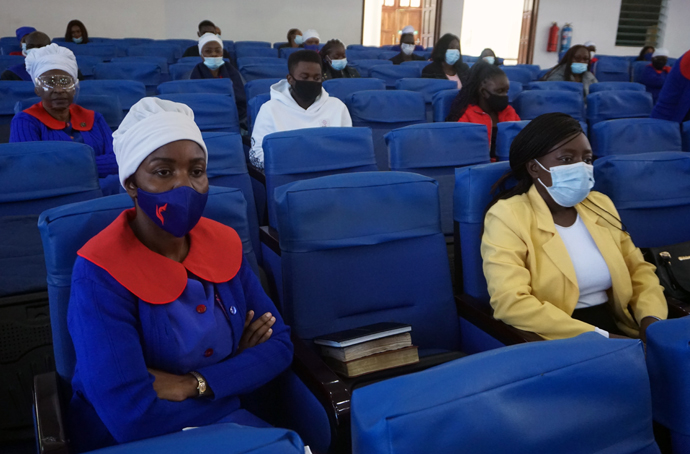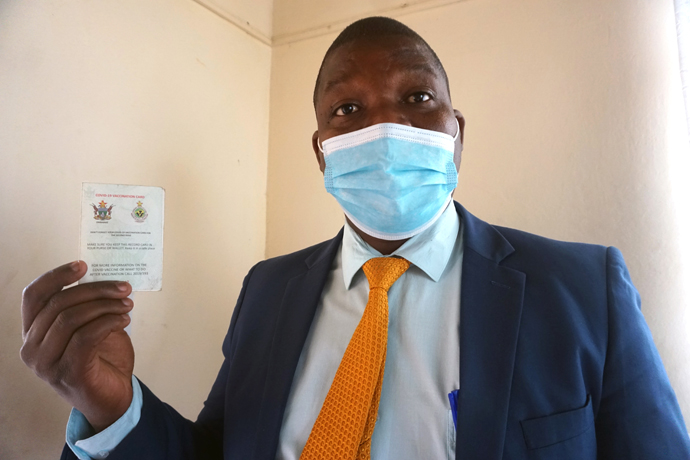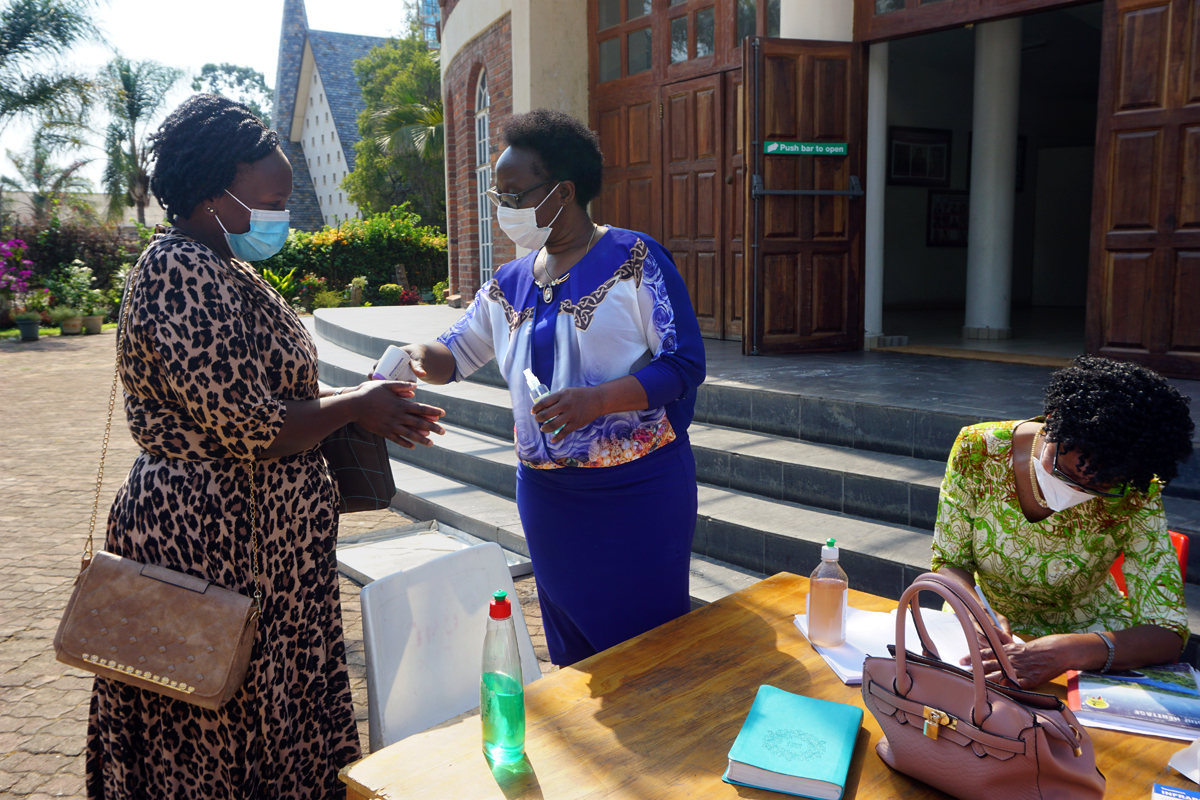Key points:
• The decision was met with mixed emotions, but church representatives stress that the church is a welcoming place of God’s grace.
• As of Nov. 2, 17.22% of the population was fully vaccinated.
• Because some cannot be vaccinated due to age or medical reasons, church representatives negotiated with the government to allow all congregants to worship together without discrimination.
• Church leaders are urging unvaccinated members to get their shots.
In Zimbabwe, mixed feelings greeted a recent government announcement that both vaccinated and unvaccinated congregants could worship together in person.
The decision followed a series of meetings after the government announced in August that only fully vaccinated congregants could participate during in-person services.
Following the Aug. 12 decision, representatives of the Zimbabwe Council of Churches, the Zimbabwe Catholic Bishops Conference, the Evangelical Fellowship of Zimbabwe and the Union for Development of Apostolic and Zionist Churches in Zimbabwe Africa noted that the order was difficult to implement because, theologically and practically, the church is an open and welcoming space for everyone. They added that no one has ever needed qualifications or qualifiers to attend church service, as it is a place of God’s grace.
As of Nov. 2, 17.22% of Zimbabwe’s population was fully vaccinated. Because some cannot be vaccinated due to age or medical reasons, the church representatives negotiated with the government to allow all congregants to worship together without discrimination.
The government heard their voices, deciding that, as of Sept. 12, both unvaccinated and fully vaccinated congregants could worship together.
Some celebrated the decision, while others expressed concern about the change.
“On one hand,” said the Rev. Gift Machinga, pastor-in-charge at Cranborne United Methodist Church in Harare, “there was joy and excitement to be allowed to worship after a very long time. For the vaccinated, the joy overshadowed all other things. Because of this group, we did not waste time to put things in place and opened our doors.”
For three consecutive Sundays, worship attendance increased, he added.
“There was joy, ululation and dancing when the doors were opened for all, regardless of vaccination status,” Machinga said. “Attendance was overwhelmingly high. We are considering running two services to adhere to COVID-19 prevention protocols, especially the required 100 participants per service.”

Churchgoers wear masks and practice social distancing in the sanctuary of Chisipiti United Methodist Church in Harare, Zimbabwe. The government announced in September that both vaccinated and unvaccinated congregants can worship in-person together. Photo by Kudzai Chingwe, UM News.
Weekly announcements from the pastor encourage members to be vaccinated.
Shepherd Fusire serves Mutoko Center United Methodist Church. He said attendance at the church’s first services after reopening only to vaccinated members was small.
“The first attendance had only eight people,” Fusire said. “The second had 31, and each person had to show their vaccination card. People were still scared despite being vaccinated.
“The vaccinated people were a quarter of the whole congregation,” he continued. “Many refrained from vaccination due to myths, misconceptions and misinformation.”
Some considered themselves immune to the disease.
“They said that they had survived through the use of traditional means and would continue to use the same should the pandemic worsen,” Fusire said.
The Rev. Elias Mutasa, Mutoko Mudzi District superintendent, acknowledged that COVID-19 has caused great suffering, sickness and death. Many people want to be comforted in the church, he said.
“Jesus Christ, in Matthew 11:28, says, ‘Come to me, all you who are weary and burdened, and I will give you rest,’” he quoted. “As a church, we welcome everyone. Attendance has started to increase.” He urged members to adhere to World Health Organization COVID-19 measures.
Daisy Hwema, 73, a member of Mudzi Central United Methodist Church, said, “I am not yet vaccinated because the doctor is monitoring my condition. I am happy that I can now attend the church service.”
The Rev. Courage Mutengeraro, associate pastor of Rusape Innercity United Methodist Church, said attendance is slowly increasing. Rusape is a small town east of Harare.
“All precautionary measures are being adhered to,” Mutengeraro said. “Live service has much more impact in African culture than virtual. People will be spiritually uplifted while the church gets the required financial support. We continue to educate our congregants about the importance of vaccination.”

The Rev. Shepherd Fusire of Mutoko United Methodist Church in Mutoko, Zimbabwe, shows his vaccination card. In August, the government announced that only fully vaccinated members could participate during in-person worship, but that decision was changed in September. Photo by Kudzai Chingwe, UM News.
Dr. Peter G. Musuka is a general practitioner, a member of Chisipiti United Methodist Church and a survivor of the virus. He likened COVID-19 to the story of Noah. Noah listened to God’s instructions and was saved. He constructed an ark and went into isolation against the floods.
“Similarly,” Musuka said, “we are told to take the precautionary measures against the pandemic. Those who fail to adhere to the instruction succumb to the disease.”
Musuka became ill with COVID-19 in December. “It is a nasty and painful disease,” he said. “You can hardly walk, and it destroys your senses of smell, taste and many other areas.
“Social media has been awash with misinformation. Listen to the government, WHO and other related agencies. Get vaccinated.”
He expressed concern about the decision to allow vaccinated and unvaccinated congregations to worship together.
“I do not know how wise it is. Vaccines cause the body to develop immunity-based resistance to further infections and no serious development of the disease that may lead to subsequent hospitalization.
“Once you get vaccinated,” Musuka continued, “the risk of infection is threefold to fivefold lower, and your risk of getting ill from COVID-19 is over eightfold lower. Your risk of being hospitalized or succumbing to COVID-19 is 25-fold lower. Vaccine does not prevent infection, but it arms the body.”
He emphasized the importance of wearing a mask, sanitizing, maintaining social distance and not attending funerals, which can be super spreaders of the virus.
“Zimbabwe needs to vaccinate 10 million people to reach herd immunity (66% of the adult population),” Musuka said. “It is not by might that the battle is won, but by the grace of God. Let us play our part, get vaccinated and, together, we will win.”
The Rev. Alan Masimba Gurupira, Zimbabwe Episcopal Area administrative assistant to Bishop Eben K. Nhiwatiwa, recalled the parable of the wedding banquet in Matthew 22:11, in which Jesus emphasized compliance.
“Similarly,” he said, “let us all comply to WHO and government advice and be vaccinated,” he said. “In Luke 5:14, the lepers were required to show themselves to the priest — a certificate of cleansing.”
He said the government order was proactive, not discriminatory, and was helpful in managing the spread of the pandemic.
“Go and get vaccination for you and me to be saved,” he said.
Chingwe is a communicator for the Zimbabwe East Conference.
News media contact: Julie Dwyer at [email protected]. To read more United Methodist news, subscribe to the free Daily or Weekly Digests.
Like what you're reading? Support the ministry of UM News! Your support ensures the latest denominational news, dynamic stories and informative articles will continue to connect our global community. Make a tax-deductible donation at ResourceUMC.org/GiveUMCom.




